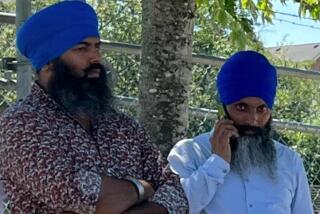Power Struggle Over Temple Reflects Politics as Usual : Religion: Sikh community representatives examine the feud in North Hollywood and point to sociocultural causes.
The internal struggle for control of the North Hollywood Sikh temple is not unusual among American Sikhs, whose religion in this country often contains a volatile mix of politics, money, traditions of physical bravery and difficulty in adjusting to U.S. democratic ideals, according to two prominent Sikhs.
âSikhs are very generous people who are supposed to donate 10% of their income,â Rajen Anand said Thursday. Anand is chairman of the Indo-American Political Assn., an advocacy group for immigrants and their descendants from all areas of India.
âWhen there is a death, birthday, graduation or whatever in the family, you give money to the gurdwara (temple),â said Anand, who is also professor of physiology at Cal State Long Beach.
âSome Sikhs who have come to this country recently do not understand that gurdwaras cannot run without money, and those who give money to establish the temples want to manage the temple,â Anand said. âBack in India, the people who manage the temples are not necessarily the biggest donors.â
Taking a contrary tack, Gurcharan Dhillon, who recently stepped down after three terms as president of the Washington-based World Sikh Organization, said that Sikhs who control temples tend to be intolerant of criticism, an attitude that is accepted in the Sikh homeland in the Punjab region of India but sometimes runs afoul of the freedom of speech that Sikh immigrants learn in America.
âYou will see the same situation in gurdwaras in Yuba City, Calif., where there is a high concentration of Sikhs; in the San Francisco Bay Area or anywhere,â said Dhillon, who is also district director in Moreno Valley for the Farmers Home Administration, a part of the U.S. Department of Agriculture.
âThis struggle is nothing unique to North Hollywood.â
Both Dhillon and Anand said that they do not know the particulars of the quarrel at the 500-member North Hollywood temple, the largest of three Sikh worship groups in the San Fernando Valley.
But a spokesman for a 150-family Sikh group that worships in rented quarters in Granada Hills, Harry Manku, expressed concern Thursday that news of the fight at the North Hollywood temple would hurt its upcoming appeal to the Los Angeles City Council to overturn adverse rulings by city zoning administrators against their proposal to build a gurdwara in North Hills.
âIâm afraid itâs going to be something negative for us,â Manku said.
Sikhism, a 500-year-old monotheistic religion that differs from Hinduism and Islam while retaining some features of both, preaches peace, prayer and kindness to strangers as foremost spiritual values, but it also honors physical bravery and fierce devotion.
A high proportion of Sikhs serve in the military and law enforcement in India and were earlier known as fabled warriors in British colonial regiments. Small ceremonial swords worn by devout Sikhs are symbols, in part, of that tradition of honoring bravery.
When members of the militant Sikh Youth of America took physical control of the North Hollywood temple this month, the dissidents said they were backed by as many as 300 temple members unhappy with the leadership. The leaders in turn charged in a lawsuit that the dissidents used violent means to seize control.
To some extent, their differences of opinion coincide with polarization among American Sikhs over how much attention should be focused on the sometimes violent struggle by militant Sikhs to wrest independence for the Punjab from India, which they accuse of persecuting Sikhs.
But many older Sikhs in this country feel that compatriots who become U.S. citizens should âcut the umbilical cord to the politics of India,â as Anand put it in an interview.
Among newcomers, âthere is too much focus on culture, culture, culture,â Anand said. âThere is nothing wrong with preserving the good aspects of your culture, but if it segregates you from the mainstream, it hurts you and your children.â
Dhillon characterized the Sikh dilemma in America in terms of different understandings of authority in India and the United States.
In America, he said, people have the right to criticize President Clinton without fear of reprisal. In India, âif you say a word against an elected official, you could be thrown in jail,â Dhillon declared. Whether the leaders of temples or other organizations are Sikh Youth of America or the older generation, they tend to be intolerant of other views, Dhillon said.
âWe have adopted the rights allowed in a democratic system, but we have not taken the responsibility that goes with those rights,â he said.
More to Read
Sign up for Essential California
The most important California stories and recommendations in your inbox every morning.
You may occasionally receive promotional content from the Los Angeles Times.










